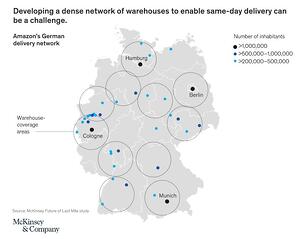Re-inventing the store
Retailers competing in online sales and delivery scramble? Solution is under their noses – their stores could be turned into fulfillment centers.


As retailers rush to compete in the online sales and delivery game, the solution could be right under their noses – their stores could be turned into fulfillment centers.
The number of empty stores in malls and shopping streets has dramatically increased over the past year – and looks set to continue this year. Online shopping and Covid-19 have certainly accelerated the closures. Many of these are due to business failures, but retailers who are at the lower end of revenue performance are also a clear target for permanent closure.
From a consumer’s perspective, with every improved experience the bar of expectations increases. Delivery speed of online orders is no different. So how can retailers address this?
McKinsey has studied this and, based on a case study in Germany, calculated that to provide Amazon-like same-day fulfillment to the 20 largest cities it would require the establishment of 11 new distribution centers at a big cost. (see graphic).


An alternative way?
Traditional retailers have something Amazon do not have – a network of stores close to centers of population. What if you could use these to avoid the vast cost and time delay of buying new warehouses?
Expanding the purpose of these stores to become distribution nodes has the potential of being a much cheaper alternative to dedicated warehouses. McKinsey’s case study reveals that broadening the role of 30 stores could provide similar rapid order fulfillment capabilities to Germany’s top 20 cities but at much lower cost.
Gartner advocates a similar approach, advising retailers that stores need to diversify to a mix of traditional, fulfillment and experiential locations. Quite simply the future of the store is as a hub that supports the provision of a harmonized retail experience. While investment is needed, it is far less than alternatives of establishing new bespoke distribution centers.
Not all “plain sailing”
It sounds simple, but the technology requirements should not be underestimated. The agile ability to connect and orchestrate across multiple systems – quickly, irrespective of vendor or heritage (or indeed whatever you may need to incorporate going forward as you address new customer needs) is essential.
The ability to connect across systems, channels, stores, partners and devices is key. You will need to combine API management, hybrid integration, application integration, data integration, microservices and IoT integration using a consistent approach and platform. This will enable rapid connectivity to the multitude of systems involved as the store role expands.
webMethods is the only integration platform that can connect anything, anywhere. Over 300 field-tested connectors accelerate your progress without coding. The vendor-agnostic approach avoids vendor lock-in as your needs change going forward.
Rapid delivery is the new normal for retailers and rapid, easy connectivity of the supporting technology will streamline the transformation of stores as central hubs for harmonized retail.
Click below to see how webMethods can help you deliver a harmonized retail experience.